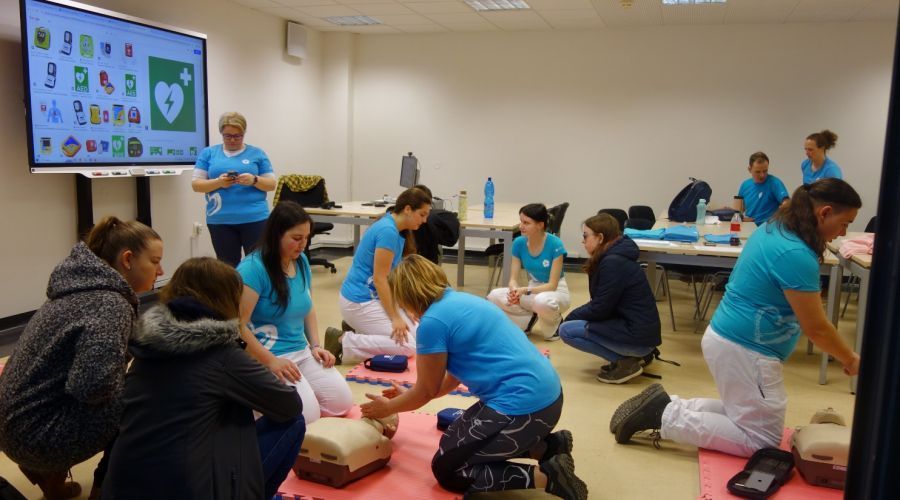The first of the workshops on how to use automated external defibrillators to save lives was very well received

On Tuesday, 20 February, the first of the workshops organised by the Faculty of Health and Social Sciences at the USB Academic Library until 26 March every Tuesday morning met with great interest. It is a unique opportunity to try out in an informal and friendly atmosphere how the Automated External Defibrillator (AED) works in providing first aid. Those interested can try out these devices with our students and lecturers next time, on the following dates: 27 February, 5 March, 19 March and 26 March, always from 8:30 to 11 am. Advance registration is not required, workshops are free. Anyone interested in learning how to use this very intuitive device, which will give them a chance to save someone's life before the paramedics arrive, can come.
This was the main motivation of all the participants, among whom students from the University of South Bohemia campus were the majority. On this campus, the AED is available at the K3 dormitory and the Faculty of Science. Its students also took turns at the resuscitation models. Nikola Jozic, for example, was already familiar with the device, as well as the Rescue app she has on her cell phone. 'I'm a scout leader, so this overview is part of my job, but I was happy to take the opportunity to try it out and ask questions. I like the way the event is organized, I learned everything I needed here,' summarized the Master's student.
At the Academic Library club, participants were taught all morning by General Nursing students and their instructors, including Mgr. František Dolák, Ph.D., who is the Deputy Director of the Institute of Nursing, Midwifery and Urgent Care. It was this department, together with Tartu Health Care College in Estonia, that was awarded the international project entitled 'Automated External Defibrillators Save Lives' last year. This project was submitted under the Erasmus+ programme, which is aimed at promoting education, training, youth, and sport in Europe. A series of workshops for the University of South Bohemia is part of this project. 'On the very first day, we had an excellent response and a number of reactions saying that such training should be compulsory. In fact, we met people who told us that they would not know what to do at the moment. By giving them this opportunity, they found out that during resuscitation, all you need is two hands - this device guides you by telling you how to proceed step by step,' summarised Dr Dolák, who is the project's principal researcher.